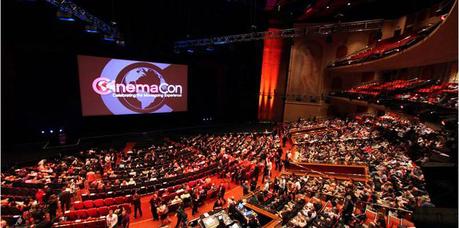
Last year, Sean Parker, the Napster founder played by Justin Timberlake in Social Network, attempted to disrupt the business model underpinning the entire film industry the same way he once did with the film industry. He wanted to make new movies available to rent for $50 on the same day they came out in theaters. To the delight of many theater owners, that proposal ended up not going anywhere. However, his idea was hardly new, and it still hasn't gone away. The studios have long desired to rush their movies to the home video market as quickly as possible, strike while the iron is hot. The difference today is that movie theater owners, who've long since viewed their exclusive 90-day window on new movies as being crucial to their survival, might finally be willing to listen.
That's according to THR, which reports the question of the theatrical release window will be the biggest story to watch at this week's CinemaCon, the annual gathering of theater owners, film studio executives and distribution outlets. The release window used to be 120 days. Then the studios whittled it down to 90. Can they maybe now get it down to 45?
Eh, it's a little more complicated than that.
The studios are proposing the creation of a premium video on demand service which will offer new movie rentals for a high price while they are still in theaters. As analyst Jeff Block pointed out to THR, the studios already offer premium films on pay-per-view at hotels. They now want to do the same in the digital realm. Theater owners appear amenable to the concept, but are angling for a cut of the profits (which they probably won't get) or at least some assurance that this new PVOD service won't alter the regular VOD and DVD release windows, which can only begin after the 90-day theatrical window has come and gone.
To sum up the theater owners' position, want to sell a still-playing-in-theaters movie online for an exorbitant price, as in three times the cost of a ticket? Sure. Try to rush that same movie to the home video or VOD market before it has ended its theatrical run? Still not cool.
But what kind of prices are we talking about? And would this be a day-and-date situation like Sean Parker posed?
This, too, is complicated because antitrust laws (theoretically) prevent the studios from colluding on a business venture like this. As such, several of the studios have proposals on the table which best suit their needs, and not surprisingly the two most aggressive plans come from the studios who are either owned by cable companies or are about to be.
Comcast-owned Universal wants to be able to offer its movies for home viewing for $40 after just 10 days in theaters. Soon-to-be-part-of-AT&T Warner Bros. wants to charge $50 after 17 days. Fox has the most reasonable proposal, charging a $30 rental fee for new movies after 45 days in theaters.
Sony and Paramount have no such proposals, although they are said to agree that a PVOD service could help make up for the lost revenue from the cratering DVD market. The people at Disney, of course, want nothing to do with this shit because they don't need it, not with they way they are currently thriving in the current system.
Some kind of deal is expected before the end of the year, but what specific form it takes remains to be seen.
For further information, check out my breakdown of the pro's and con's of Sean Parker's original idea. It's a year later, but the economic principles and market forces which made his idea so popular with people like Steven Spielberg and Peter Jackson remain the same.

